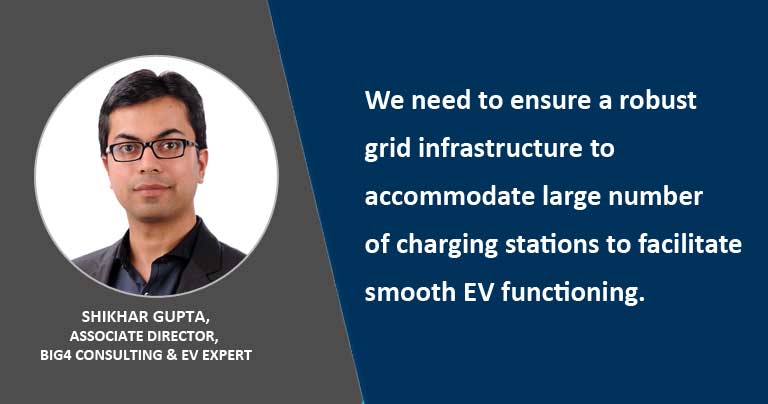Increasing localisation and incentivisation will boost EV supply chain
By EPR Magazine Editorial November 10, 2021 11:10 am IST
By EPR Magazine Editorial November 10, 2021 11:10 am IST

Shikhar Gupta, Associate Director, BIG4 Consulting & EV Expert in an interview with EPR Magazine.
Infrastructural development to set up EV charging stations in India is said to be a challenge. How is the industry reinventing the thought?
Establishing the necessary EV charging infrastructure requires certain key challenges to be addressed. Land (location), local power distribution infrastructure, and collaboration between require stakeholders are the key pillars for the same.
We are witnessing Industry reinventing this via –
Under the PLI scheme, what kind of opportunities do you expect for the local battery makers and solution providers?
The PLI scheme is a clear indication from the government to position India as the leading manufacturer of advanced EV technology. While we had had FAME II and several state subsidies, PLI scheme is will boost the EV supply chain, and promote domestic manufacturing and engineering in advanced technologies such as Lithium-ion battery technology, where India is currently imports dependent. It is also likely to create more employment in this space, attract foreign investment, and make EV companies and start-ups more attractive for the talent. Since, the PLI scheme for the auto sector is open to existing automotive companies as well as new investors; we can expect several new non-traditional players to enter the market in the coming years.
What measure is being taken by the industries and the government to make EV a reality
Government policies are acting as a strong catalyst for OEMs and start-ups to build cleaner and sustainable mobility solutions. More than 16 states now have EV and storage policies, FAME II have been extended, PLI scheme has been launched. Further, revised guidelines on charging infrastructure were issued by the ministry of power, prescribing at least one charging station in a grid of 3km and at every 25kms on both sides of the highways. Similarly, the ministry of housing and urban affairs amended the Model Building ByeLaws to mandate 20 percent of the parking space for EV charging in commercial and residential buildings. Hence, all government entities are regulators are coming together on the same page to make this a reality.
What are the required legislative support to EV transition and reduce carbon emissions?
India is moving rapidly to reduce emission intensity of GDP by 33- 35 percent over 2005 levels by 2030, set under the Paris Agreement. Whether it’s achieving 100 GW of renewable capacity by August 2021, announcing Hydrogen Mission, or EV vision 30@30, progress can be seen across corridors to position India as the clean energy leader. To accelerate EV transition, India permitted the sale and registration of two and three-wheeler EVs without pre-installed batteries; several states are offering financial incentives such as direct subsidies for the purchase of EVs, scrapping incentives for ICE vehicles for the next three years; exemptions of road tax, waiver of the registration fee, and interest waiver on loans for commercial buyers. Mandating fleets such as cabs, taxis, logistics delivery vehicles are likely to pave the way for India’s EV transition.
We use cookies to personalize your experience. By continuing to visit this website you agree to our Terms & Conditions, Privacy Policy and Cookie Policy.